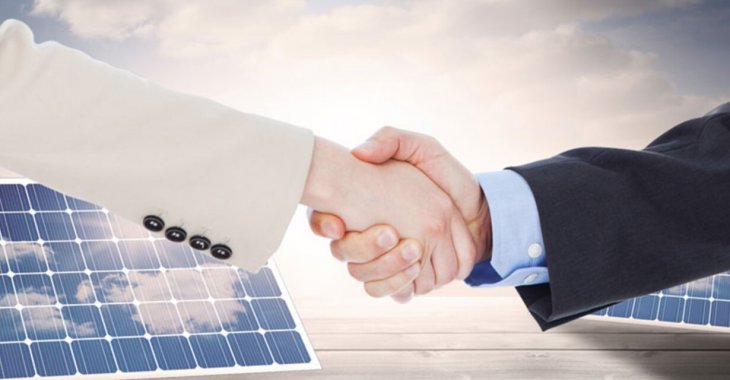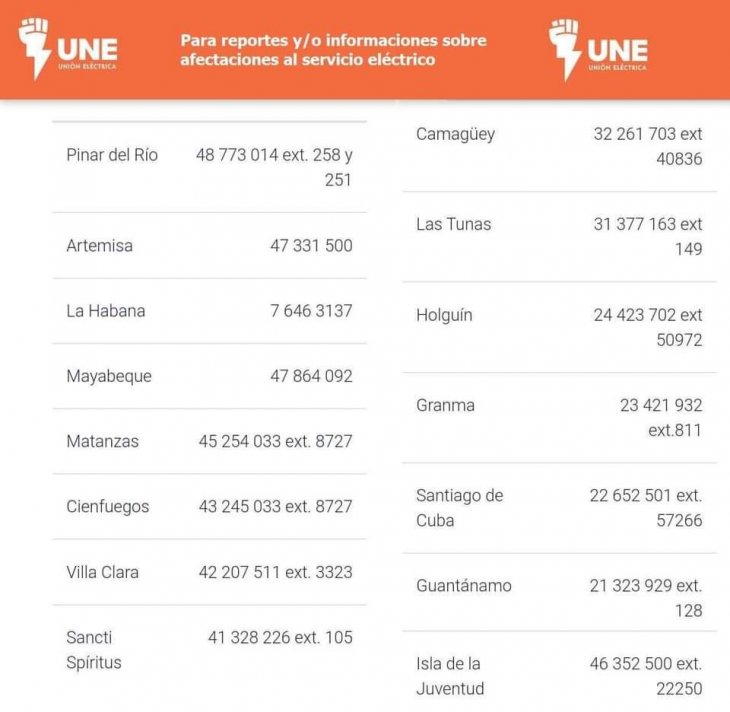Electricity
Mission
Direct, coordinate, execute and control compliance with the policy approved by the State and the Government for the sustainable development of the activities of the electricity sector in the country and the attention to its business system.
Function
1. Guarantee the preparation of application policy proposals in the Electricity branch, in coordination with the National Energy Policy and Strategy Directorate, for submission to the Government's approval, as well as their periodic updating and control their implementation, once approved.
2. Guarantee the preparation of the proposals for the development programs of the Electricity branch, in the medium and long term, in coordination with the National Energy Policy and Strategy Directorate, for their presentation to the approval of the Government, as well as their periodic updating and its implementation, once approved.
3. Control compliance with state and government policy regarding the generation, transmission, distribution and commercialization of electricity.
4. Collaborate, with the National Energy Policy and Strategy Directorate and the MEP, in the process of drawing up electricity consumption plans for all sectors of the country
5. Advise, in conjunction with the National Energy Policy and Strategy Directorate and the MEP, in the preparation of the national balance of electrical energy and its updating.
6. Collaborate with the MEP in the elaboration of the directives for the elaboration of the short and medium term plans and the determination of its directive indicators, in the sphere of its competence.
7. To dictate the approval of the short and medium term plans, presented by the UNE ensuring compliance with the directives in this regard.
8. Advise the Minister and the Governing Board in the direction and control of the business system of the Electric Union.
9. Establish the indicators to evaluate the results of the management of the Electric Union and its business system and control their compliance periodically.
10. To rule on the performance of the Electricity Union, for the financial economic analysis of the Ministry with said organization, as well as for the annual balance.
11. Investigate jointly with the Electric Union the business opportunities with foreign capital, in this sphere.
12. To dictate the draft negotiation directives in this area for the constitution of AEI.
13. Control compliance, by the designated negotiating team, of the negotiation directives approved for the constitution of each AEI, in this area.
14. To rule on the proposals of Constitutive Documents of the AEI and the economic technical foundation of the business, in this sphere, together with the other organizational units of the Ministry.
15. Control the results of the AEIs in operation, in this area.
16. Execute, in conjunction with the Electricity Union, the directives of the Cuban side, to be evaluated in the Boards of Directors and Shareholders that ensure compliance with state policy.
17. To rule on the requests for extension and dissolution of the AEI constituted.
18. Control the rational use of foreign technical assistance by UNE.
19. Collaborate, together with the Directorate of Organization, Planning and Information, in the preparation of policy proposals and strategies for collaboration and scientific-technical cooperation of the electrical activity.
20. Control, in conjunction with the Organization, Planning and Information Directorate, compliance with the collaboration programs of the branch or activity it serves, signed with countries and International Institutions.
21. To rule on the technical-economic feasibility studies and the preparatory documentation for the new investments in its sphere of attention.
22. To rule on the proposals of the Investment Plans, in the short and medium term, in its sphere of attention.
23. Control the investment process of the UNE, in particular of the investments in execution selected.
24. Advise the Directorate of the Ministry. authorization to start the start-up of new investments, if applicable.
25. Evaluate the results of the selected investments, once concluded, determining whether they met the objective for which the investment was conceived.
26. Control the strategic projection in the electricity sector, for the development of quality systems, environmental management, science and technology, investments and maintenance.
27. Control the program for the shutdowns of the main electricity generation plants for their maintenance and capital repairs.
28. Promote the introduction of research results, technology transfer and technological advances in the electricity sector, controlling their inclusion in short, medium and long term plans.
29. Promote collaborative relationships with universities and research centers in the electricity sector.
30. Control the research - development program of the Electricity Sector, as well as the application of its results.
31. Controlling the application of safety and health regulations at work, in its sphere of competence.
32. To rule on the proposed export and import substitution policy in its sphere of attention.
33. Control compliance, by the UNE, of the export and import policy approved by the Ministry, promoting and controlling the development of productions and services that create exportable funds. and / or substitute imports.
34. Control the execution of the export and import substitution plans and programs of the UNE
35. Control ONURE in the fulfillment of its functions for the regulation, inspection and control of electricity consumption, in all entities of the country.
36. Control the UNE in the correct application of the rules and regulations for the rational and efficient use of fuels, lubricants and electricity, which includes promoting the approval of projects aimed at increasing efficiency in their use.
37. To dictate the proposal of the regulatory framework for the rational use of electrical energy and for the control of the operation of the Emergency Generating Sets throughout the country.
38. Promote the dissemination by the mass media of actions aimed at saving electricity.
39. Direct the carrying out of inspections within the scope of its competence.
40. Direct the process of preparing the tariff proposals to be applied for the collection of electricity.
41. Contribute to updating the studies on the country's energy matrix, proposing the introduction of variants for its improvement, in coordination with the National Energy Policy and Strategy Directorate.
42. Execute the schedule change proposal in the country, to submit it to the government's approval.
43. Advise the Directorate of the Ministry, in the preparation and analysis of proposals for legal provisions, rules and regulations of the branches or activities within its competence.
44. At the request of the Ministry's direction, attend to technical-production agreements, work plans and protocols, preparing evaluative reports with recommendations for decision-making at the corresponding level.
Directory
GENERAL MANAGER: Ramón Miguel Pedrera Valdés
EMAIL: pedrera@minem.gob.cu
PHONE: (+537) 8775069
DIRECTORATE OF INVESTMENTS AND ELECTRICITY BUSINESSES
Mission
Direct, coordinate and control the strategic planning process and the development and investment programs of the electricity sector, as well as the projection of the International economic associations in this matter.
DIRECTOR: Juan Manuel Presa Sagué
EMAIL: presa@minem.gob.cu
PHONE: (+537) 8775012
DIRECTORATE OF PLANNING, EVALUATION AND CONTROL OF ELECTRICITY
Mission
Supervise, control and evaluate compliance with the State and Government policy for the generation, transmission, distribution and commercialization of electricity and the rational use of electricity in the country.
DIRECTOR: Eugenio P. Vidal Valdés
EMAIL: vidal@minem.gob.cu
PHONE: (+537) 8775027
Energy Observatory

The contracting or financing of photovoltaic solar energy to the UNE is a benefit for natural and legal persons in Cuba
Questions and Answers about the new Electricity rate
Most frequent concerns of consumers regarding the New Electricity Rate
1. What is the “average” monthly consumption per household (residential sector) in Cuba?
Rta / During 2020, the average consumption of the residential sector in Cuba is 185 kWh.
2. I want to know how much is the cost of electricity in Cuba, how much does it cost the electrical union to produce one kW? Does the kW cost the state 3.61 pesos to produce it as explained by Murillo?
Rta / In the question itself is the answer; but it is possible to elaborate, explaining that 95% of the kilo-watt-hours that are produced in the country, is made with fossil fuels and of the total fuel used for the generation of electricity, 50.1% must be imported. That Cuba's access to the fuel market is not free from setbacks, caused by the blockade and fear of suppliers, who on many occasions have commercial interests in the territory of the United States, and tax the price of their products to Cuba in order to hedge against the risk of US sanctions.
3. Why not establish the collection of a reduced electricity rate at night?
Rta / It is interesting, and also necessary, that the UNE evaluate and propose alternative rates, which are aimed at lowering its production costs. This, together with the execution of the Program for the installation of renewable energy sources and the increase in energy efficiency, will allow the country's energy performance to be improved.
4. What is the electricity rate for the non-residential sector?
Rta / For the non-residential sector there is more than one tariff, these are conditioned by several elements: type of electrical service, voltage level at which they are connected to the network, time of use of the service, maximum demand of the network, maximum demand at different times of the day and the price of fuel.
5. Consideration should be given to increasing the retail sale of LED luminaires, bulbs and tubes, which, as is well known, save a lot of energy. Consideration should also be given to increasing the sale of solar heaters and photovoltaic cells.
Rta / This has not only been thought about, but is included in the Program for the development of renewable energy sources and energy efficiency. The financial difficulties of our economy have slowed down the execution of projects, but in fact, they are concrete actions that contribute significantly to improving energy efficiency on the consumer side.
6. How can I purchase and how much solar panels do I need to cover the electrical consumption of my home?
Rta / The Program for the Development of renewable energy sources and energy efficiency conceives the sale of panels to natural persons. The rules for the implementation of this sale are in force. Unfortunately, our industry, due to the economic and financial difficulties that we are going through, has not been able to guarantee the production of photovoltaic panels to make available to the retail network for sale to the population. Currently, the photovoltaic systems installed in the residential sector are very few and the result of the importation of natural persons.
To know how many panels you need to cover your electricity consumption, the first thing that is required is to know what the daily consumption of your home is; To do this, divide the average monthly consumption of your home by 30 (this information appears on the electric bill receipt). To better illustrate, we suggest doing an exercise. Suppose your average monthly consumption is 185 kWh.
1st. 185 kWh / 30 days is equivalent to an average daily consumption of 6.16 kWh.
2nd. We multiply the average daily consumption by 1000 to find the amount of net energy in watts that is required to be captured from the photovoltaic system:
6.16 kWh x 1000 = 6160 watt-hours
3rd. We divide the total value of energy required by 5, which is the average number of hours of daily sunlight that are used for the panel to capture and store:
6160 watt-hours / 5 hours = 1232 watts is the power required in panels for your home.
4th. Now it corresponds to divide that power required in panels for your home by the power of the panel to know how many panels you need. Here again we must make an assumption, because the powers of the panels can vary according to the manufacturer. Suppose then that the power of the panels is 260 watts,
1232/260 = 4.74 ≈ 5 panels.
That is, it requires 5 panels to cover the daily consumption of your home with solar energy.
7. How many kW do the main electrical appliances consume monthly?

8. If the new rate is based on the price of fuel in the international market, should it not change?
Rta / Of course.
9. What will happen to the nuclei that enter only 1 salary for the payment of electricity?
Rta / It will depend on the amount of that single salary and the amount of consumption. Presumably, in a household where only one salary enters, consumption is not large, however, let's do an exercise with several possible alternatives for a family made up of a working adult and two school-age children.
CASE 1: The only income of the house is equal to the minimum wage (2100 CUP) and the consumption of the house is 150 kWh.
With the current rate, if that adult today also earns the minimum wage (225 CUP), he pays for the 150 kWh:
0.09 CUP x 100 kWh + 0.30 CUP x 50 kWh = 9 + 15
= 24 CUP; the electricity bill of that house today represents 10.66% of the income of the house.
With the new rate:
0.40 CUP x 100 kWh + 1.30 CUP x 50 kWh = 40 + 65
= 105 CUP; the electricity bill for that home will represent 5% of the home's income.
CASE 2: The only income of the house is equal to the minimum wage (2100 CUP) and the consumption of the house is 250 kWh.
With the current rate, if that adult today also earns the minimum wage (225 CUP), he pays for the 250 kWh:
(0.09 CUP x 100 kWh) + (0.30 CUP x 50 kWh) + + (0.40 CUP x 50 kWh) + (0.60 CUP x 50 kWh) = = 9 + 15 + 20 + 30 = 74 CUP; the electricity bill of that house today represents 32.88% of the income of the house.
With the new rate:
(0.40 CUP x 100 kWh) + (1.30 CUP x 50 kWh) + + (1.75 CUP x 50 kWh) + (3.00 CUP x 50 kWh) = = 40 + 65 + 87.50 + 150 = 342.50 CUP; the electricity bill for that home will represent 16.30% of the home's income.
CASE 3: The only income of the house is equal to the minimum wage (2100 CUP) and the consumption of the house is 350 kWh.
With the current rate, if that adult today also earns the minimum wage (225 CUP), he pays for the 350 kWh:
(0.09 CUP x 100 kWh) + (0.30 CUP x 50 kWh) + + (0.40 CUP x 50 kWh) + (0.60 CUP x 50 kWh) + + (0.80 CUP x 50 kWh) + (1.50 CUP x 50 kWh) = = 9 + 15 + 20 + 30 + 40 + 75 = 189.00 CUP; the electricity bill of that house today represents 84% of the income of the house. This is a hypothetical exercise, because if it were real, one would have to wonder how this family manages to live today.
With the new rate:
(0.40 CUP x 100 kWh) + (1.30 CUP x 50 kWh) + + (1.75 CUP x 50 kWh) + (3.00 CUP x 50 kWh) + + (4.00 CUP x 50 kWh) + (7.50 CUP x 50 kWh) = = 40 + 65 + 87.50 + 150 + 200 + 375 = 917.50 CUP; the electricity bill of that house will represent 43.69% of the income of the house.
However, in the event that the family does not manage to cover the payment of their basic needs with their income, Social Assistance must take care of covering this expense.
Scheduled Electrical Impairments

To find out all the information about the electric service in Cuba, contact the commercial offices of Unión Eléctrica
New information channels in each province in order to update in real time the energy situation of each territory
Informative channels by provinces in order to update in real time the energy situation of each territory
Pinar de Río: https://t.me/elecpinar
Artemisa: https://t.me/EEArtemisa
La Habana: https://t.me/ceelh
Mayabeque: https://t.me/electricamayabeque
Matanzas: https://t.me/EmpresaElectricaMatanzas
Cienfuegos: https://t.me/empresaelectricacienfuegos1
Villa Clara: https://t.me/electrico1895
Santi spiritus: https://t.me/informateessp
Ciego de Avila: https://t.me/eecav
Camagüey: https://t.me/empresa_electrica
Las Tunas: https://t.me/eleclastunas
Holguín: https://t.me/elecholguin
Granma: https://t.me/UNE_EEG
Santiago de Cuba: https://t.me/electricastgo
Guantánamo: https://t.me/elecguantanamo
Pago de la factura eléctrica por la plataforma ENZONA

ENZONA incorporates the functionality of paying for electricity services, saving time in the offices and guaranteeing greater speed in the process. To pay your electricity bill you can click on the following link: Payment by ENZONA